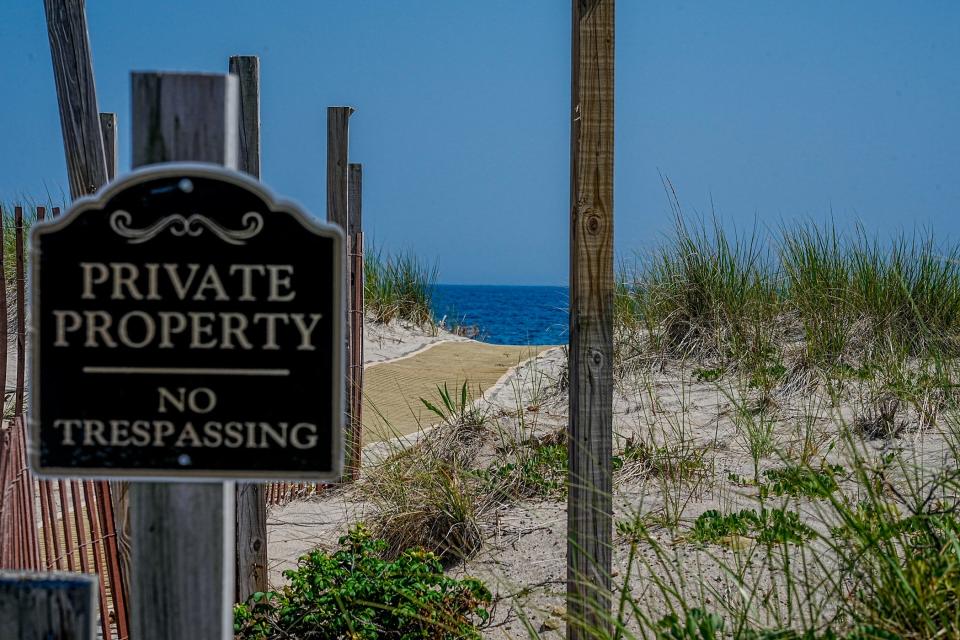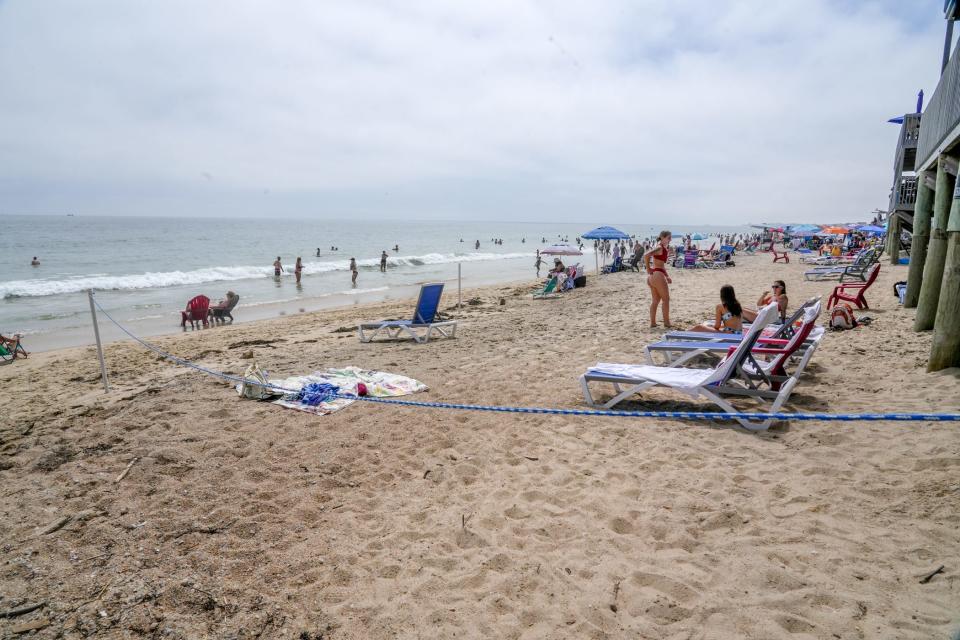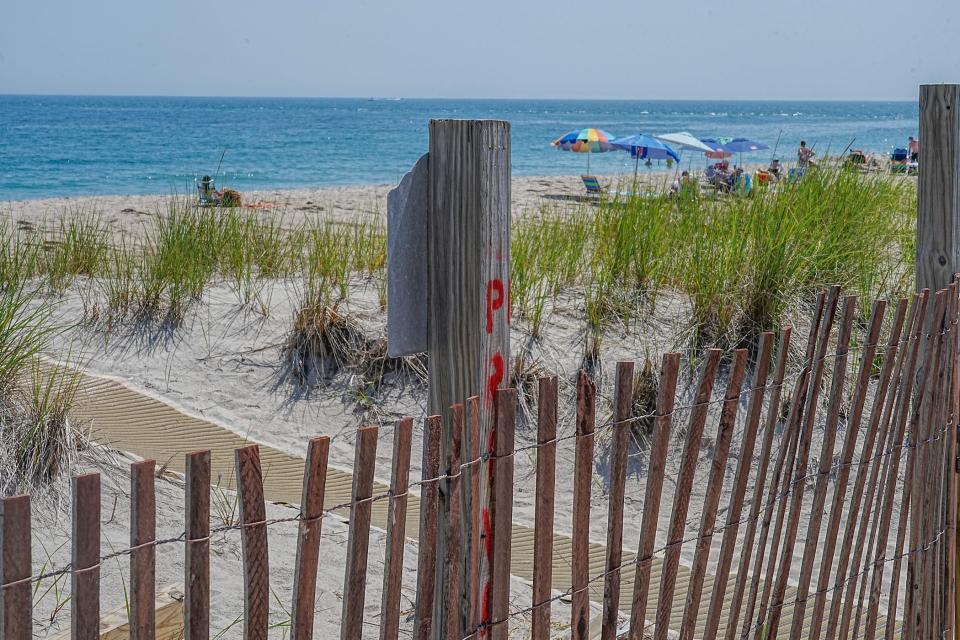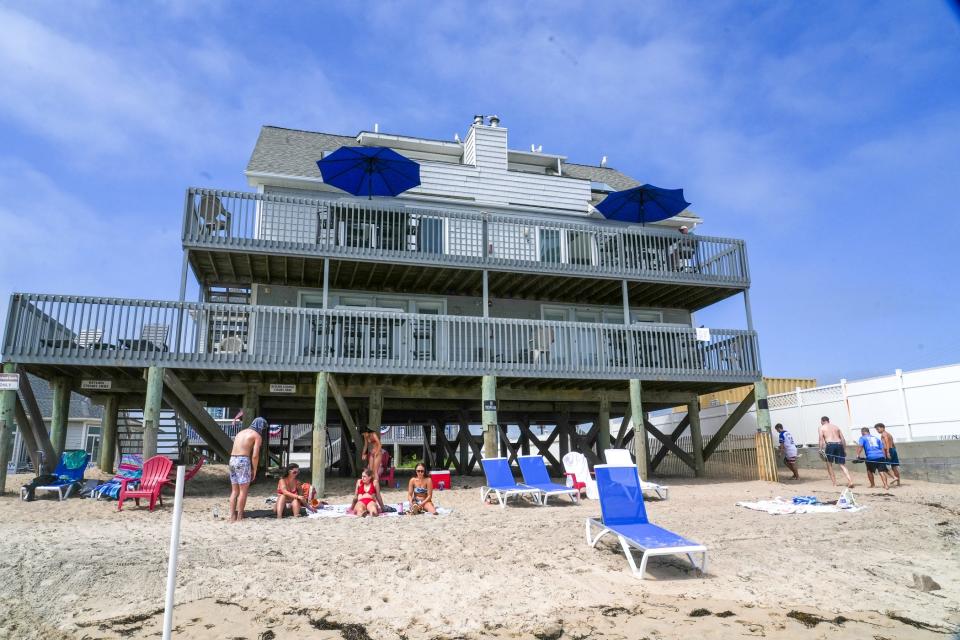RI's new beach access law creates controversy, confusion and lawsuits as line is drawn in sand
One week after Rhode Island's new shoreline access law went into effect, Scott Keeley decided to put it to the test.
The Charlestown-based activist was arrested while gathering seaweed in 2019, in an incident that spurred public outcry and ultimately inspired the new legislation. So on July 3, with his striped beach chair in tow, he returned to the same spot where he'd been accused of trespassing.
He weaved through the crowds at Charlestown Town Beach and kept walking east, past a large sign stating, "Town Beach Property Ends Here — Private Property Beyond This Point." Then, he was stopped by a polo shirt-clad security guard.
"If you’re planning on setting up, you can’t set up past the private property sign," the guard told him.
Keeley, who captured the exchange on video, set his beach chair near the seaweed line and called the police. An officer from Charlestown arrived, and, citing the new law, told the security guard that Keeley had the right to be there. Gradually, other beachgoers took note and began walking past the fence to set up chairs and towels of their own.
His quest? Walk RI's entire coast: But private property and blocked access are a challenge

"I guess the security guard didn’t know what to do," Keeley told The Providence Journal. "She stopped telling people that they couldn’t be there."
After a multiyear fight to make shoreline access law, the last few weeks have given Rhode Islanders a taste of what it actually looks like in practice.
For beach-access advocates — as well as police departments that had struggled to adjudicate disputes — the law offers some much-needed clarity around what is and isn't considered public. But according to the waterfront property owners who are suing to overturn it, it's effectively turned private backyards into public beaches, lowering their home values.
Meanwhile, plenty of people don't realize that the law has changed at all. And Keeley is now focused on ensuring that there are penalties for those who seek to block the public from exercising their rights.
"People should know what the law is, and that it’s there for their enjoyment, finally," he said.
Shifting sands: Who has access to Lloyd's Beach in Little Compton?

New law leads to immediate action in Westerly
The new shoreline-access law states that the public can exercise the "rights and privileges of the shore" on any beach as long as they're no more than 10 feet above — aka inland — of the recognizable high tide line, also commonly recognized as the seaweed line.
After passing the General Assembly in the final days of the legislative session, it was signed by Gov. Dan McKee on June 26 and went into effect immediately.
Within about a week, police in some coastal communities began getting calls.
'It's crazy': CRMC faces scrutiny over handling of Matunuck Oyster Bar shellfish farm

On July 4, for instance, Westerly police received a complaint about ropes set up in front of the Atlantic Beach Casino Resort in Misquamicut that were blocking the 10-foot zone.
The property manager at the timeshare "gave us the runaround for about two hours," so officers finally took the ropes down themselves, Westerly police chief Paul Gingerella said. He added that he eventually was able to speak with the property's owner, who indicated a willingness to comply with the law. (The Journal's attempts to reach the resort for comment were unsuccessful.)
In some other parts of the state, though, things have been fairly quiet.
"We haven’t had any calls for it yet," said Narragansett Police Chief Sean Corrigan. He said that the department was aware of the new law and prepared to enforce it, but "historically speaking, we don’t get a lot of these complaints."
Political Scene: How did a Warwick councilwoman acquire land next to her house? The neighbors have questions
In years past, the mean high water mark — which is based on scientific calculations and is not visible to the eye — was typically considered the boundary between public and private beach.
Without a clear line to point to, police had a tough time determining if someone was trespassing on private property or if public access was being obstructed, Gingerella said. Now, with the new law in effect, responding to complaints has become more straightforward.
"We just didn’t have a clear-cut line," he said. "This makes it easier for us."

Can you set up a beach chair? Police in Charlestown say yes
One thing that the law doesn't address is what you can do when you get to the 10-foot buffer zone. Fishing, gathering seaweed and passage along the shore are explicitly protected in Rhode Island's Constitution. But can you plop down a towel or a beach umbrella and stay for a while?
Keeley argues that you can, in fact, do anything that isn't already considered illegal. (In other words, no public nudity or drunkenness.) And when he put that to the test on July 3, Charlestown police officers backed him up.
In one video that Keeley captured, the security guard can be heard telling police officers that she didn't stop anyone from walking along the beach. "I just said that they couldn't set up," she says.
"He can set up, too," one of the officers tells the guard, gesturing to the beach chair that Keeley placed directly above the seaweed line. "He's fine right where he's at right now. ... Have you guys checked on the law that just passed?"
More: One RI man's quest to find old-growth forests and his mission to protect century-old trees
The guard passes over her phone so that the officer can speak with the man who hired the security company. "I think you're mistaken in your interpretation," the man, identified only as Michael, tells the police. He argues that the law allows people to walk, swim or gather seaweed, but "it does not say that they have the right to use the property or occupy the property."
"They can’t stop them from passing through, or even setting up," the police officer counters. Later, he adds that guards "have to be careful with their language, because if their language is not on point, they’re going to be held responsible."
It's unclear whether the security guard was hired by one specific homeowner or by a neighborhood association. Keeley said he wasn't sure. The security company, N.E.S. Solutions, did not return a call seeking comment.
Property owners' lawsuit seeks to overturn new law
For years, Keeley has been asserting his constitutional right to use the shoreline directly east of Charlestown Town Beach, where he encountered the security guard. (Though it's accessed from Charlestown, that portion of the barrier beach is technically in South Kingstown.)
So it's perhaps unsurprising that two out of the three officers of a new group called the Rhode Island Association of Coastal Taxpayers — which is attempting to overturn the shoreline-access law — own property along that same stretch of beach.
More on the lawsuit: 'Get off my sand?': Coastal homeowners sue over shoreline law, but state is prepared to fight
Just a few days after Keeley's run-in with the security guard, RIACT filed suit in federal court. Over the long July Fourth holiday weekend, the lawsuit alleges, members of the public "trespassed" on private properties in Charlestown and South Kingstown that belong to the group's president, David Welch, and other RIACT members — and did so under the color of law.
"RIACT beachfront property owners purchased their residentially developed coastal property with the understanding, right, and expectation of using their property for private, exclusive use, including for private family beach gatherings," the complaint states.
The lawsuit contends that the new law amounts to an unconstitutional "taking" under the Fifth Amendment. It makes the case that some waterfront properties have deeds that use the mean high water mark as a boundary, but the state has now established a new boundary that's higher up on the beach — without compensating homeowners.
In other words, land that was once considered private property "is now subject to public beach use," argues RIACT, which is being represented pro-bono by the libertarian Pacific Legal Foundation.
And when naturally occurring forces move the seaweed line further inland, "the public beach area created by the Act will also move farther inland onto previously unburdened parcels of private, coastal property," the suit says, alleging that the new law "operates as a mechanism for a perpetual, unpredictable conversion of private coastal land into public beach areas."
Attorney General Peter Neronha has indicated that he is ready to defend the law, which remained in effect as of press time. However, RIACT is seeking an injunction that would prevent it from being enforced while the lawsuit is pending.

Can people who block public access be penalized?
While some property owners have been attempting to reverse the law, activists like Keeley have been trying to ensure that the beachgoing public actually gets to use it.
That means pushing officials to crack down on misleading signs, unauthorized barriers and anything else that might act as a deterrent. After his run-in with the security guard, Keeley filed a complaint with the South Kingstown police — he was just over the town line when the confrontation happened — and is hoping they will press charges.
South Kingstown police chief Matthew C. Moynihan said in an email that the incident was "under investigation," and that police had "no details to share at this time." He said that the police report would not be released while the incident was still being investigated.
"I think we need to make it clear that blocking people from their constitutional right to the shore is not right," Keeley said. "And it’s against the law."
Who rules RI's forgotten old roads? Advocates push to preserve public access
The new law doesn't impose any penalties for preventing the public from using the shoreline, but Keeley believes that another state statute — 11-44-24 of the Rhode Island General Laws — serves that purpose.
Under that law, anyone who obstructs or blocks "any public rights-of-way to water areas of the state" can be fined up to $500 or jailed for up to one year. The implication, Keeley says, is that "no one is allowed to block people from accessing the shore."
Until he challenged the security guard, Keeley noted, no one had questioned the idea that they weren't allowed to sit down on the opposite side of the fence.
"I think that one of the saddest things was that not one person had said, 'Hold on, we have a new law,'" he said. "One hundred percent of the population obeyed that security guard."
This article originally appeared on The Providence Journal: RI activists and property owners test law defining beach access

